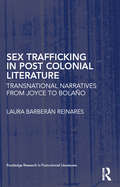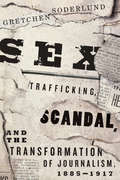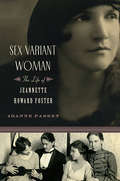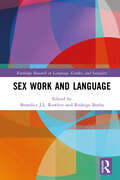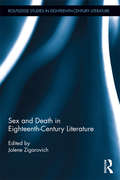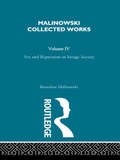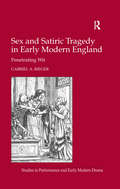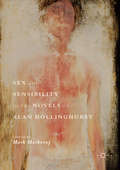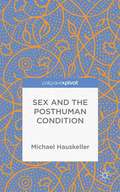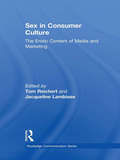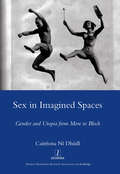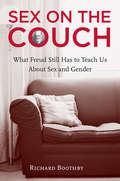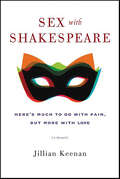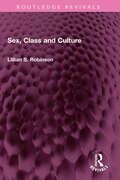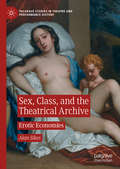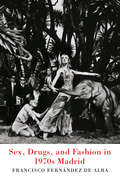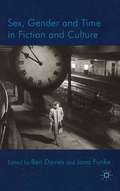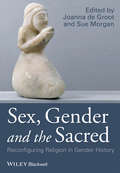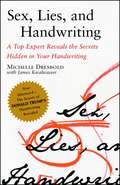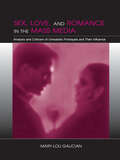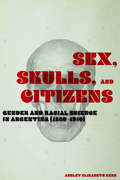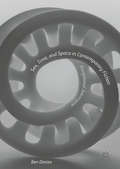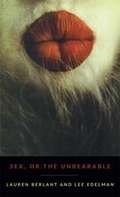- Table View
- List View
Sex Trafficking in Postcolonial Literature: Transnational Narratives from Joyce to Bolaño (Routledge Research in Postcolonial Literatures)
by Laura Barberán ReinaresAt present, the bulk of the existing research on sex trafficking originates in the social sciences. Sex Trafficking in Postcolonial Literature adds an original perspective on this issue by examining representations of sex trafficking in postcolonial literature. This book is a sustained interdisciplinary study bridging postcolonial literature, in English and Spanish, and sex trafficking, as analyzed through literary theory, anthropology, sociology, history, trauma theory, journalism, and globalization studies. It encompasses postcolonial theory and literature’s aesthetic analysis of sex trafficking together with research from social sciences, psychology, anthropology, and economics with the intention of offering a comprehensive analysis of the topic beyond the type of Orientalist discourse so prevalent in the media. This is an important and innovative resource for scholars in literature, postcolonial studies, gender studies, human rights and global justice.
Sex Trafficking, Scandal, and the Transformation of Journalism, 1885-1917
by Gretchen SoderlundDuring the first half of the nineteenth century, the penny presses of the industrial East treated brothels as a mundane, if annoying, aspect of city life. But later in the century, reformers and mainstream papers began to push back against this representation through highly public campaigns against "white slavery. " These newspaper crusades mixed a potent cocktail of lurid sexual detail and sensationalist scandal aimed equally at promoting anti-vice measures, arousing popular demand for progressive reform, and increasing newspaper circulation. In Sex Trafficking, Scandal, and the Transformation of Journalism, Gretchen Soderlund offers a new way to understand sensationalism in both newspapers and reform movements. By tracing the history of high-profile print exposés on sex trafficking by journalists like William T. Stead and George Kibbe Turner, Soderlund demonstrates how controversies over gender, race, and sexuality were central to the shift from sensationalism to objectivity--and crucial to the development of journalism in the early twentieth century.
Sex Variant Woman: The Life of Jeanette Howard Foster
by Joanne PassetA stunning biography of the long-neglected, firebrand author of the obible of lesbian literature, OCO Jeannette Howard Foster"
Sex Work and Language (Routledge Research in Language, Gender, and Sexuality)
by Rowlett, Benedict J.L. Rodrigo BorbaThis collection brings together established and exciting new voices to shed light on the language of and about sex work, offering an empirically nuanced understanding of commercial sex through language.While there is burgeoning literature on sex work in the social sciences, there has been little work to date centering it from a linguistic perspective. Chapters make the case for language as central to sex work practices and the transactions of intimacy in the negotiation of services, promotional strategies and the performance of desire. Featuring insights from diverse geographic contexts, the chapters critically reflect on different dimensions of language and sex work, including sex work, gender and desire; online sex work; sex work and race; sex worker advocacy; and the language of victimization and exploitation. The volume illuminates the ways in which commercial sex work is negotiated in embodied linguistic interaction and attendant issues of power, identity, gender, race and desire.This book systematizes the body of growing knowledge around language and sex work from an interdisciplinary lens. It is key reading for scholars, policymakers and activists in sociolinguistics and discourse analysis, as well as fields such as anthropology, sociology, criminology and health and social care.
Sex and Aesthetics in Samuel Becketts Work (New Interpretations of Beckett in the Twenty-first Century)
by Paul StewartThis book places sex and sexuality firmly at the heart of Beckett. From the earliest prose to the late plays, Paul Stewart uncovers a profound mistrust of procreation which nevertheless allows for a surprising variety of non-reproductive forms of sex which challenge established notions of sexual propriety and identity politics.
Sex and Death in Eighteenth-Century Literature (Routledge Studies in Eighteenth-Century Literature #10)
by Jolene ZigarovichThis book discusses sex and death in the eighteenth-century, an era that among other forms produced the Gothic novel, commencing the prolific examination of the century’s shifting attitudes toward death and uncovering literary moments in which sexuality and death often conjoined. By bringing together various viewpoints and historical relations, the volume contributes to an emerging field of study and provides new perspectives on the ways in which the century approached an increasingly modern sense of sexuality and mortality. It not only provides part of the needed discussion of the relationship between sex, death, history, and eighteenth-century culture, but is a forum in which the ideas of several well-respected critics converge, producing a breadth of knowledge and a diversity of perspectives and methodologies previously unseen. As the contributors demonstrate, eighteenth-century anxieties over mortality, the body, the soul, and the corpse inspired many writers of the time to both implicitly and explicitly embed mortality and sexuality within their works. By depicting the necrophilic tendencies of libertines and rapacious villains, the fetishizing of death and mourning by virtuous heroines, or the fantasy of preserving the body, these authors demonstrate not only the tragic results of sexual play, but the persistent fantasy of necro-erotica. This book shows that within the eighteenth-century culture of profound modern change, underworkings of death and mourning are often eroticized; that sex is often equated with death (as punishment, or loss of the self); and that the sex-death dialectic lies at the discursive center of normative conceptions of gender, desire, and social power.
Sex and Repression in Savage Society: [1927] (Routledge Classics Ser.)
by Bronislaw MalinowskiThis volume explores and challenges the applicatio psychoanalytic theory to the study of traditional societies.
Sex and Satiric Tragedy in Early Modern England: Penetrating Wit (Studies in Performance and Early Modern Drama)
by Gabriel A. RiegerDrawing upon recent scholarship in Renaissance studies regarding notions of the body, political, physical and social, this study examines how the satiric tragedians of the English Renaissance employ the languages of sex - including sexual slander, titillation, insinuation and obscenity - in the service of satiric aggression. There is a close association between the genre of satire and sexually descriptive language in the period, author Gabriel Rieger argues, particularly in the ways in which both the genre and the languages embody systems of oppositions. In exploring the various purposes which sexually descriptive language serves for the satiric tragedian, Rieger reviews a broad range of texts, ancient, Renaissance, and contemporary, by satiric tragedians, moralists, medical writers and critics, paying particular attention to the works of William Shakespeare, Thomas Middleton and John Webster
Sex and Sensibility in the Novels of Alan Hollinghurst
by Mark MathurayThis book is a challenging and engaging collection of original essays on the novels of Alan Hollinghurst, Britain's foremost gay writer and the English novel's master stylist. The essays engage the precarious and shifting relationship between sex and literary sensibility in his novels and, thus, also attempt to establish the parameters of a new critical discourse for future research on Hollinghurst's novel, queer theory and the contemporary literary representations of masculinity and sexuality. By coupling the consideration of Hollinghurst's aesthetics, his sensuously evocative style, to an interrogation of the social, political and sexual currents in his texts, the contributors of this collection provide distinctive interpretations of Hollinghurst's novels, from Hollinghurst's uncovering of a gay artistic heritage to his re-signification of earlier English literary styles, from his engagement with the Symbolist fin de si#65533;cle to his critique of aestheticism, etc. , whilst paying close attention to the formally innovative qualities of his texts.
Sex and the Posthuman Condition
by Michael HauskellerThis book looks at how sexuality is framed in enhancement scenarios and how descriptions of the resulting posthuman future are informed by mythological, historical and literary paradigms. It examines the glorious sex life we will allegedly enjoy due to greater control of our emotions, improved capacity for pleasure, and availability of sex robots.
Sex in Consumer Culture: The Erotic Content of Media and Marketing (Routledge Communication Series)
by Tom Reichert Jacqueline LambiaseSex in Consumer Culture: The Erotic Content of Media and Marketing considers the use of sex to promote brands, magazines, video games, TV programming, music, and movies. Offering both quantitative and qualitative perspectives from leading scholars in a variety of disciplines, this volume addresses a range of integral issues such as media promotion, racial representations, appeals to gay and lesbian communities, content analyses, and case studies. Chapters represent diverse perspectives, addressing such questions as:*What happens when sexual content created for adults reaches children?*What meaning do sexual words and images have within the contexts of sporting events, trade shows, video games, personal ads, or consumer Web sites?*What effects might sex-tinged images have on audiences, and where should the focus be for new effects research?*Where are the current boundaries between pornography and mainstream sexual depictions?Exploring sexual information as it is used in mass media to sell products and programs, Sex in Consumer Culture is an important collection, and it will be of great interest for scholars and students in advertising, marketing, media promotion, persuasion, mass communication & society, and gender studies.
Sex in Imagined Spaces: Gender and Utopia from More to Bloch
by Caitriona DhuillFrom Thomas More onwards, writers of utopias have constructed alternative models of society as a way of commenting critically on existing social orders. In the utopian alternative, the sex-gender system of the contemporary society may be either reproduced or radically re-organised. Reading utopian writing as a dialogue between reality and possibility, this study examines the relationship between historical sex-gender systems and those envisioned by utopian texts. Surveying a broad range of utopian writing from the nineteenth and twentieth centuries, including Huxley, Zamyatin, Wedekind, Hauptmann, and Charlotte Perkins Gilman, this book reveals the variety and complexity of approaches to re-arranging gender, and locates these 're-arrangements' within contemporary debates on sex and reproduction, masculinity and femininity, desire, taboo and family structure. These issues occupy a position of central importance in the dialogue between utopian imagination and anti-utopian thought which culminates in the great dystopias of the twentieth century and the postmodern re-invention of utopia.
Sex on the Couch: What Freud Still Has To Teach Us About Sex and Gender
by Richard BoothbyFirst published in 2006. Routledge is an imprint of Taylor & Francis, an informa company.
Sex with Shakespeare: Here's Much to Do with Pain, but More with Love
by Jillian KeenanA provocative, moving, kinky, and often absurdly funny memoir about Shakespeare, love, obsession, and spankingWhen it came to understanding love, a teenage Jillian Keenan had nothing to guide her—until a production of The Tempest sent Shakespeare’s language flowing through her blood for the first time. In Sex with Shakespeare, she tells the story of how the Bard’s plays helped her embrace her unusual sexual identity and find a love story of her own.Four hundred years after Shakespeare’s death, Keenan’s smart and passionate memoir brings new life to his work. With fourteen of his plays as a springboard, she explores the many facets of love and sexuality—from desire and communication to fetish and fantasy. In A Midsummer Night’s Dream, Keenan unmasks Helena as a sexual masochist—like Jillian herself. In Macbeth, she examines criminalized sexual identities and the dark side of “privacy.” The Taming of the Shrew goes inside the secret world of bondage, domination, and sadomasochism, while King Lear exposes the ill-fated king as a possible sexual predator. Moving through the canon, Keenan makes it abundantly clear that literature is a conversation. In Sex with Shakespeare, words are love.As Keenan wanders the world in search of connection, from desert dictatorships to urban islands to disputed territories, Shakespeare goes with her —and provokes complex, surprising, and wildly important conversations about sexuality, consent, and the secrets that simmer beneath our surfaces.
Sex, Class and Culture (Routledge Revivals)
by Lillian RobinsonFirst published in 1986, Sex, Class and Culture is a collection of Marxist feminist essays that develops an original critical theory and applies it to literature, the visual arts, and mass media. Lillian Robinson was the first American critic to suggest the essential connections among sex, class, and race as forces that shape works of art and the critical response to them. In applying her theory to particular texts, she considers topics from the Renaissance epic to the Regency romance, from Jane Austen to contemporary feminist poets, and from factory workers’ memoirs to TV images of career women and housewives. The essays are insightful because Robinson clearly knows this wide assortment of texts, cares about their significance, and writes about them with wit. They are irreverent, because she asserts the feminist critic’s permanent responsibility to ask "So What?" and they are controversial because she constantly addresses that question to our most powerful and respectable institutions – social and literary. This book will be of interest to students of literature, history, gender studies and sexuality studies.
Sex, Class, and the Theatrical Archive: Erotic Economies (Palgrave Studies in Theatre and Performance History)
by Alan SikesIn Sex, Class and the Theatrical Archive: Erotic Economies, Alan Sikes explores the intersection of struggles over sex and class identities in politicized performances during key revolutionary moments in modern European history. The book includes discussions of sodomitical closet dramas from the decades surrounding the English Glorious Revolution of 1688; the performances of 'Tribades and Amazons', public women of the French Revolution; the 'homophilic elitism' in the early plays of Brecht and Hasenclever from the years just before and after the German Revolution that marked the founding of the short-lived Weimar Republic; and the utopian conception of a Soviet 'New Woman' set to take the stage after the Russian Revolution of 1917. Throughout, Sikes invokes the differences between past and present politicized performances in order to cast our own political imaginings into sharper and more critical relief.
Sex, Drugs, and Fashion in 1970s Madrid (Toronto Iberic)
by Francisco Fernandez de AlbaDuring the last decade of Franco’s repressive rule, the Spanish outlook on sex, drugs, and fashion shifted dramatically, creating a favorable cultural environment for the return of democracy. Exploring changes in urban planning, narratives of sexual and gender identity, recreational drug use, and fashion design during the seventies, Sex, Drugs, and Fashion in 1970s Madrid argues that it was during this decade that the material and emotional conditions for the groundbreaking transition to democracy first began to develop. Thanks in part to a mass media saturated with international trends, citizens of Madrid began to adopt practices, behaviors, and attitudes that would ultimately render Franco’s military dictatorship obsolete. This cultural history examines these modest but irreversible changes in the way people lived and thought about their lives during the last decade of the regime’s creed. Not a revolution necessarily, but transformational nevertheless, these changes in collective sensibility eased the political transition to democracy and the emergence of the eighties’ cultural movement la Movida.
Sex, Gender and Time in Fiction and Culture
by Ben Davies Jana FunkeInvestigating modern art, literature, theory and the law, this book illustrates the different ways in which sex, gender and time intersect. It demonstrates that time offers new critical perspectives on sex and gender and makes problematic reductive understandings of sexual identity as well as straight and queer time
Sex, Gender and the Sacred: Reconfiguring Religion in Gender History (Gender and History Special Issues)
by Joanna De Groot Sue MorganSex, Gender and the Sacred presents a multi-faith, multi-disciplinary collection of essays that explore the interlocking narratives of religion and gender encompassing 4,000 years of history. Contains readings relating to sex and religion that encompass 4,000 years of gender history Features new research in religion and gender across diverse cultures, periods, and religious traditions Presents multi-faith and multi-disciplinary perspectives with significant comparative potential Offers original theories and concepts relating to gender, religion, and sexuality Includes innovative interpretations of the connections between visual, verbal, and material aspects of particular religious traditions
Sex, Lies, and Handwriting: A Top Expert Reveals the Secrets Hidden in Your Handwriting
by Michelle Dresbold James KwalwasserHave you ever looked at someone and thought: He looks honest. She seems friendly. He doesn't look like a serial killer. Are you always right? Looks can be deceiving, but handwriting never lies. Handwriting profiling is an amazingly accurate tool for assessing how people think, feel, and act. In fact, handwriting profiling is so accurate that the FBI, the CIA, and the Israeli intelligence agency Mossad use it to build detailed psychological profiles of some of the world's most dangerous individuals. And thousands of major corporations use handwriting profiling to help them make the right hiring decisions. Handwriting expert Michelle Dresbold -- the only civilian to be invited to the United States Secret Service's Advanced Document Examination training program -- draws on her extensive experience helping law enforcement agencies around the country on cases involving kidnapping, arson, forgery, murder, embezzlement, and stalking to take us inside the mysterious world of crossed t's and dotted i's. In Sex, Lies, and Handwriting, Dresbold explains how a single sentence can provide insight into a person's background, psychology, and behavior. Throughout the book, Dresbold explores the handwriting of sly politicians, convicted criminals, notorious killers, suspected cheats, and ordinary people who've written to Dresbold's "The Handwriting Doctor" column for help. She shows you how to identify the signs of a dirty rotten scoundrel and a lying, cheating, backstabbing lover. And she introduces you to some of the most dangerous traits in handwriting, including weapon-shaped letters, "shark's teeth," "club strokes," and "felon's claws." (When you see these traits in someone's script, she says, "it's time to stop reading and start running!") Dresbold also explains how criminals are tracked through handwritten clues and what spouses, friends, or employees might be hiding in their script. Finally, Dresbold re-examines the handwriting evidence in several notorious unsolved cases. She uncovers fascinating clues that reveal the secret side of Lizzie Borden, acquitted of the ax murder of her parents in 1893's "trial of the century." Dresbold also reveals astonishing details about the author of the JonBenÉt Ramsey ransom note, and she presents startling new evidence that exposes the real Jack the Ripper (contrary to popular theories, he wasn't a prince or a painter after all). Sex, Lies, and Handwriting will have you paying a bit more attention to your -- and everyone else's -- penmanship.
Sex, Love, and Romance in the Mass Media: Analysis and Criticism of Unrealistic Portrayals and Their Influence (Routledge Communication Series)
by Mary-Lou GalicianThis accessible yet research-based text offers both foundational theories and practical applications of analysis and criticism of mass media portrayals of sex, love, and romance in a wide variety of mass media, from entertainment to advertising to news. The multidisciplinary methodological perspective comes out of a media literacy approach and embraces a variety of traditions along the quantitative-qualitative continuum. Focused on portrayals of male-female coupleship, the book is centered around the 12 major myths and stereotypes of Galician's Dr. FUN!'s Mass Media Love Quiz©, each of which has a corresponding Dr. Galician Prescription® that encapsulates healthy strategies--rarely found in the mass media--to counteract that myth or stereotype. Readers learn how to identify, illustrate, deconstruct, evaluate, and reframe the mass media's mythic and stereotypic portrayals of sex, love, and romance. They also learn how to use their own formal critical evaluations to clarify their own values and--as media consumers or mass communication creators--to share their insights with others. Thus, the learning objectives encompass all three major educational domains: cognitive, affective, and behavioral. Part I of this book covers the five foundations: *myths and stereotypes of love and coupleship;*models of realistic and constructive love and coupleship;*mass media storytelling approaches, techniques, and devices;*research and theories of mass media effects; and*strategies and skills of media literacy. Part II is devoted to exploring the myths and stereotypes identified in the Quiz. Following several brief case studies and a summary of related research and commentary, each chapter focuses on analyses and criticisms of portrayals of sex, love, and romance in the content of news and advertising, as well as entertainment using Galician's Seven-Step Dis-illusioning Directions. Each chapter concludes with a "Dis-illusion Digest."While critical of unrealistic portrayals and the damage they can cause unsuspecting media consumers, Galician--a media literacy advocate--is not anti-media. Rather, her goal is to empower consumers to use these portrayals with more awareness of their possible consequences, to resist adopting them as models for actual behavior, and to consciously reframe them into more realistic, productive scenarios. This unique text is an engaging classroom resource for media literacy, media and relationships, and media and society coursework.
Sex, Skulls, and Citizens: Gender and Racial Science in Argentina (1860-1910)
by Ashley Elizabeth KerrAnalyzing a wide variety of late-nineteenth-century sources, Sex, Skulls, and Citizens argues that Argentine scientific projects of the era were not just racial encounters, but were also conditioned by sexual relationships in all their messy, physical reality. The writers studied here (an eclectic group of scientists, anthropologists, and novelists, including Estanislao Zeballos, Lucio and Eduarda Mansilla, Ramón Lista, and Florence Dixie) reflect on Indigenous sexual practices, analyze the advisability and effects of interracial sex, and use the language of desire to narrate encounters with Indigenous peoples as they try to scientifically pinpoint Argentina's racial identity and future potential.Kerr's reach extends into history of science, literary studies, and history of anthropology, illuminating a scholarly time and place in which the lines betwixt were much blurrier, if they existed at all.
Sex, Skulls, and Citizens: Gender and Racial Science in Argentina (1860-1910)
by Ashley Elizabeth KerrPROSE Awards Subject Category Finalist, 2021—Biological Anthropology, Ancient History, and Archaeology Analyzing a wide variety of late-nineteenth-century sources, Sex, Skulls, and Citizens argues that Argentine scientific projects of the era were not just racial encounters, but were also conditioned by sexual relationships in all their messy, physical reality. The writers studied here (an eclectic group of scientists, anthropologists, and novelists, including Estanislao Zeballos, Lucio and Eduarda Mansilla, Ramón Lista, and Florence Dixie) reflect on Indigenous sexual practices, analyze the advisability and effects of interracial sex, and use the language of desire to narrate encounters with Indigenous peoples as they try to scientifically pinpoint Argentina's racial identity and future potential.Kerr's reach extends into history of science, literary studies, and history of anthropology, illuminating a scholarly time and place in which the lines betwixt were much blurrier, if they existed at all.
Sex, Time, and Space in Contemporary Fiction
by Ben DaviesCombining close readings of literature and theory, Sex, Time, and Space in Contemporary Fiction opens up new ways to consider the sex-time-space nexus. In an exciting and compelling contribution to contemporary literary studies, this book takes the concept of 'exceptionality' as its point of departure as developed through an exploration of Giorgio Agamben's theory of the state of exception and the work of theorists including Jacques Derrida and Michel Foucault. Through an analysis of a range of widely read contemporary fiction, including On Chesil Beach, Gertrude and Claudius, The Act of Love and Room, Ben Davies provides a rigorous exploration of narrative form and offers original theories of the prequel, narrative relations in terms of set theory, and the practice of reading itself.
Sex, or the Unbearable
by Lee Edelman Lauren BerlantSex, or the Unbearable is a dialogue between Lauren Berlant and Lee Edelman, two of our leading theorists of sexuality, politics, and culture. In juxtaposing sex and the unbearable they don't propose that sex is unbearable, only that it unleashes unbearable contradictions that we nonetheless struggle to bear. In Berlant and Edelman's exchange, those terms invoke disturbances produced in encounters with others, ourselves, and the world, disturbances that tap into threats induced by fears of loss or rupture as well as by our hopes for repair.Through virtuoso interpretations of works of cinema, photography, critical theory, and literature, including Lydia Davis's story "Break It Down" (reprinted in full here), Berlant and Edelman explore what it means to live with negativity, with those divisions that may be irreparable. Together, they consider how such negativity affects politics, theory, and intimately felt encounters. But where their critical approaches differ, neither hesitates to voice disagreement. Their very discussion--punctuated with moments of frustration, misconstruction, anxiety, aggression, recognition, exhilaration, and inspiration--enacts both the difficulty and the potential of encounter, the subject of this unusual exchange between two eminent critics and close friends.
